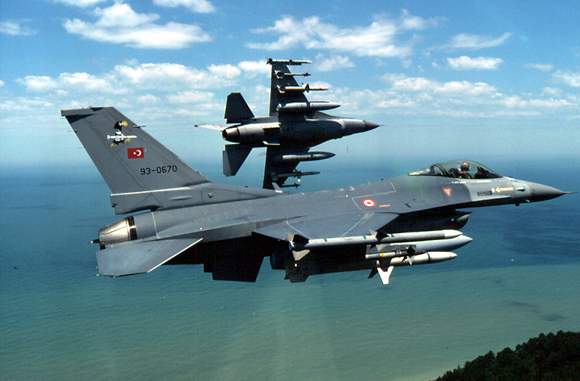As Turkey’s Foreign Ministry spokesman fumed against this week’s Greek-French defence deal, Turkish fighter jets conducted unauthorised flights over the eastern Aegean on Friday.
At 11.26 a.m., a pair of Turkish F-16s flew over the islets of Makronisi and Anthropofagoi near Fournoi, at an altitude of 29,000 feet. They were followed about a minute later by another pair of jets flying in the same area at 11,000 feet.
The overflights came shortly after Turkish Foreign Ministry spokesperson Tanju Bilgic slammed the agreement signed in Paris on Tuesday as “a threat to regional peace and stability.”
In a written statement, Tanju Bilgic took aim at Greece’s Defence Minister Nikos Panagiotopoulos, who speaking on private Skai television late Thursday, said that under the Greek-French agreement, “one country will help the other with military means if the need arises.”
Asked if the mutual defence assistance also includes maritime and land, Panagiotopoulos said that it would be valid for “the entire sovereign area” of Greece.
In response, the Turkish spokesman said Greece’s effort aim to bolster what he called “maximalist maritime zone and air space claims” that were “contrary to international law”.
Bilgic also described the pact between France and Greece as a bilateral military alliance formed against fellow Atlantic alliance member Turkey “in a way that harms the NATO alliance.”
The Turkish spokesman added that Greece’s actions would only strengthen Turkey’s resolve to protect its rights in the Aegean and Mediterranean seas.
Greece and Turkey have been at loggerheads for decades over a long series of issues, including territorial rights in the Aegean Sea, maritime and aviation boundaries, and minority rights.
On Nov. 27, 2019, Turkey signed a maritime border agreement with Libya’s internationally-recognized Government of National Accord (GNA) for the delimitation of their Exclusive Economic Zones (EEZs), seeking to create a maritime corridor between the two countries, and creating an avenue for Turkey and Libya to conduct joint natural gas exploration and drilling operations in the Eastern Mediterranean. According to the agreement, both countries have decided on a precise and equitable delimitation of their respective maritime areas in the Mediterranean in which the parties exercise sovereign rights and jurisdiction in accordance with the applicable rules of international law. The MOU also acknowledges the expectation of both countries to strengthen relations and encourage further cooperation.
Since the 18th century, the exercise of sovereignty over waters beyond a state’s coastline was limited to 3 nautical miles. Time, innovation, exploitations of maritime and subsoil resources, and ensuring territorial security have led states to feel compelled to extend their territorial waters and areas under their jurisdiction — namely the continental shelf and Exclusive Economic Zone (EEZ).
In 1982, the UN Convention on the Law of the Sea (UNCLOS), governing international law pertaining to the maritime activities and interests of different States, acknowledged the idea of the EEZ, whereby a coastal state assumes jurisdiction over the exploration and exploitation of marine resources in its adjacent section of the continental shelf, extending 200 nautical miles from the shore. According to Article 3 of the 1982 UNCLOS, a state has the right to establish the breadth of its territorial sea up to a limit not exceeding 12 nautical miles from the coast. However, the country’s EEZ, in which that country can claim mining, drilling and fishing rights, can extend an additional 200 miles.
Where the maritime distance between two countries is less than 424 miles, a bilateral agreement is required to determine a mutually agreed-upon dividing line for the respect EEZs. In the instance where the continental margin extends beyond 200 miles, a state may claim jurisdiction up to 350 miles from the baseline or 100 miles from the 2,500 meter depth line, or isobath.
In 1936, the territorial sea of Greece was set at 6 nautical miles from the natural coastline by virtue of Law 230/1936 as amended by Presidential Decree 187/1973. At the time of ratifying the UNCLOS, Greece adopted the position that the time and place in exercising its right to extend the Greek coastline is a matter which arises from its national strategy. The legislation which Greece established to ratify the UNLOS states that “Greece has inalienable rights under Article 3 of the Convention to extend at any time the range of its territorial sea to a distance of 12 nautical miles.” In response to this, Turkey by unanimous resolution of its National Assembly (8/6/1995), granted the Turkish government the legitimacy to declare war against Greece, (Casus Belli) should Greece decide to extend its territorial waters beyond 6 nautical miles.

